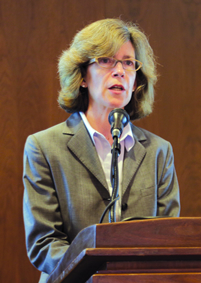
Lindsey Criswell, MD, MPH, DSc, Chief of the Division of Rheumatology at University of California, San Francisco (UCSF), has received several awards from the Rheumatology Research Foundation, including the Pilot Grant, which encourages investigators to expand promising research into rheumatoid arthritis and related autoinflammatory diseases by providing support to established researchers. Dr. Criswell used the award to investigate the patterns of DNA methylation as predictors of RA treatment response.
Dr. Criswell will speak about her research during Targeted Research: A Rheumatology Research Foundation Special Session from 4:30 – 6:00 pm Tuesday in Moscone West, Room 2011. The session features research conducted by Targeted Research Grant recipients.
Q: Tell us a little bit about your career path and how you developed an interest in research.
A: When I was in medical school at UCSF, I wanted to pursue an area of medicine as opposed to surgery because it provides opportunities to have meaningful relationships with patients. In my residency, there was an incredible rheumatology program, and I was fascinated by the diseases. There were also incredible role models. So I pursued rheumatology back at UCSF and decided to focus on clinical research.
Later, I was able to combine rheumatology training with public health training at Berkeley. Along the way, I got re-interested in the field of genetics and genetic epidemiology. For me, that was the perfect combination of my interests, including my fascination with the concept of nature versus nurture.
Q: Why are the Foundation’s efforts so important to the field of rheumatology?
A: Funding from the National Institutes of Health (NIH) has been scaled way back over the years. Previously, I was able to fund my entire research program with NIH grants, but that’s not true anymore. The Rheumatology Research Foundation has really stepped up to the plate and saved academic rheumatology from becoming insignificant in terms of research.
Q: What did receiving a grant mean to you and your career?
A: I’ve received a few grants from the Foundation that have been hugely important in allowing certain projects to continue to completion, as well as the opportunity to go back to the NIH with preliminary data and be more competitive for those funds. Also, as a division director, it’s been great to see the Foundation provide resources for trainees. None of the fellows here at UCSF would have the time needed to explore research careers without the support of the Foundation.
Q: What is the greatest impact you’ve seen the Foundation make in the last 30 years?
A: I think it’s the Foundation’s contributions to people who are in the early stages of their career. A few years ago, I served on a blue ribbon task force, and one of the highest priorities coming out of that assessment was supporting the transition from NIH K awards to R01 type awards because we knew if we couldn’t bridge that gap, we would lose people pursuing research careers. I think the Foundation really stepped up with the bridge funding, something so crucially important.
Secondly, I think we’re increasingly attracting medical students and residents through opportunities to engage in research projects made possible because of the Foundation, including programs like preceptorships that have been hugely successful. I’m seeing more people pursuing careers in rheumatology as a result of those experiences, which is so essential for the future of our field.
Q: Why is it important for ACR/ARHP members to support the Foundation?
A: Because they are saving our field!
Our research operation already wouldn’t be where it is today were it not for the Foundation. The devastation the decrease in NIH funding would have had without the Foundation is scary to imagine, and it’s in our best interest to see the Foundation thrive given its increasingly important contributions to the field of rheumatology.
